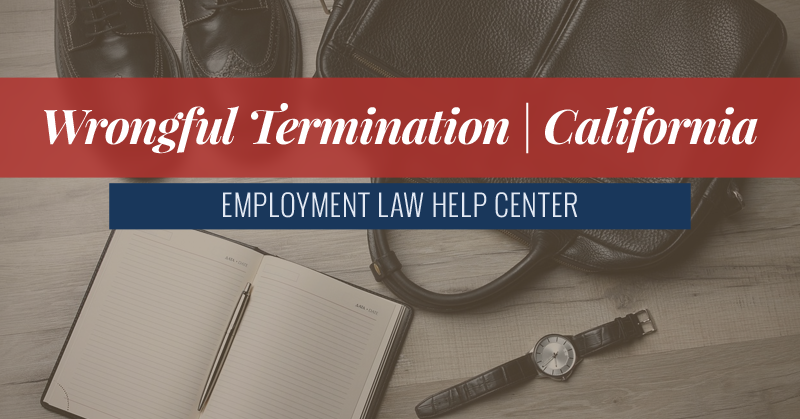California Wrongful Termination
Like many other states, California is an at-will state, which means employers in California can terminate the employee/employer relationship, or fire an employee, at any time and for any reason, or for no reason at all. However, firing an employee in California for an unlawful reason, such as having a disability, is considered a wrongful termination, although your employer’s legal counsel will likely try to use the at-will statute as justification for the termination. If you believe you have been fired or laid off for reasons that violate your legal rights, contact an experienced California wrongful termination attorney as soon as possible to discuss your options for legal recourse.

What is Wrongful Termination?
It may seem like employment laws in at-will states offer more protections for the employer rather than the employee. However, there are important exceptions to California’s at-will statute, which prohibit an employer from firing an employee on the basis of a protected characteristic, such as:
- Race
- Age (40 and over)
- National origin
- Religion
- Disability
- Marital status
- Sexual orientation
- Gender identity
- Sex (including pregnancy)
- Political affiliation
- Use of Family Medical Leave
Under California law, it is also illegal for an employer to fire a worker if the termination is based on a reason that violates the worker’s employment contract, if the contract protects the employee from being fired without just cause, or if the termination is contrary to public policy. For example, a wrongful termination claim may be brought against an employer if the employee is fired for refusing to do something illegal, or for filing a complaint with a government or law enforcement agency regarding illegal activities on the employer’s part.

Protection for Whistleblowers
Wrongful termination laws in California also offer protection for whistleblowers, making it illegal for employers to take retaliatory action against employees who report illegal or unsafe working conditions to the employer, to company management, to a government agency, or to law enforcement. This includes employee complaints about Labor Code violations, such as unpaid wages or overtime compensation, missed rest periods or meal breaks, or improper classification of an employee as an independent contractor. Under California law, a claim of wrongful termination may also be made for a “constructive termination,” which occurs when working conditions become so intolerable that no employee would reasonably be expected to continue working under those conditions, and is therefore forced to quit. For example, this may be the case in work environments where an employee faces constant harassment on the basis of his or her gender or sexual orientation.
Filing a Wrongful Termination Claim Against Your Employer
Losing your job because of a disability, pregnancy, political affiliation or sexual orientation is against the law in California, no matter what your employer tells you. If you have been fired and your employer’s decision to terminate your employment was motivated by any of the above-listed protected characteristics, even in part, you may have a valid legal claim for damages. Contact a knowledgeable California employment law attorney as soon as possible to discuss your options for legal recourse. By filing a wrongful termination claim against your employer, you may be able to recover damages for emotional trauma, lost wages and benefits, attorney’s fees, and other losses.




